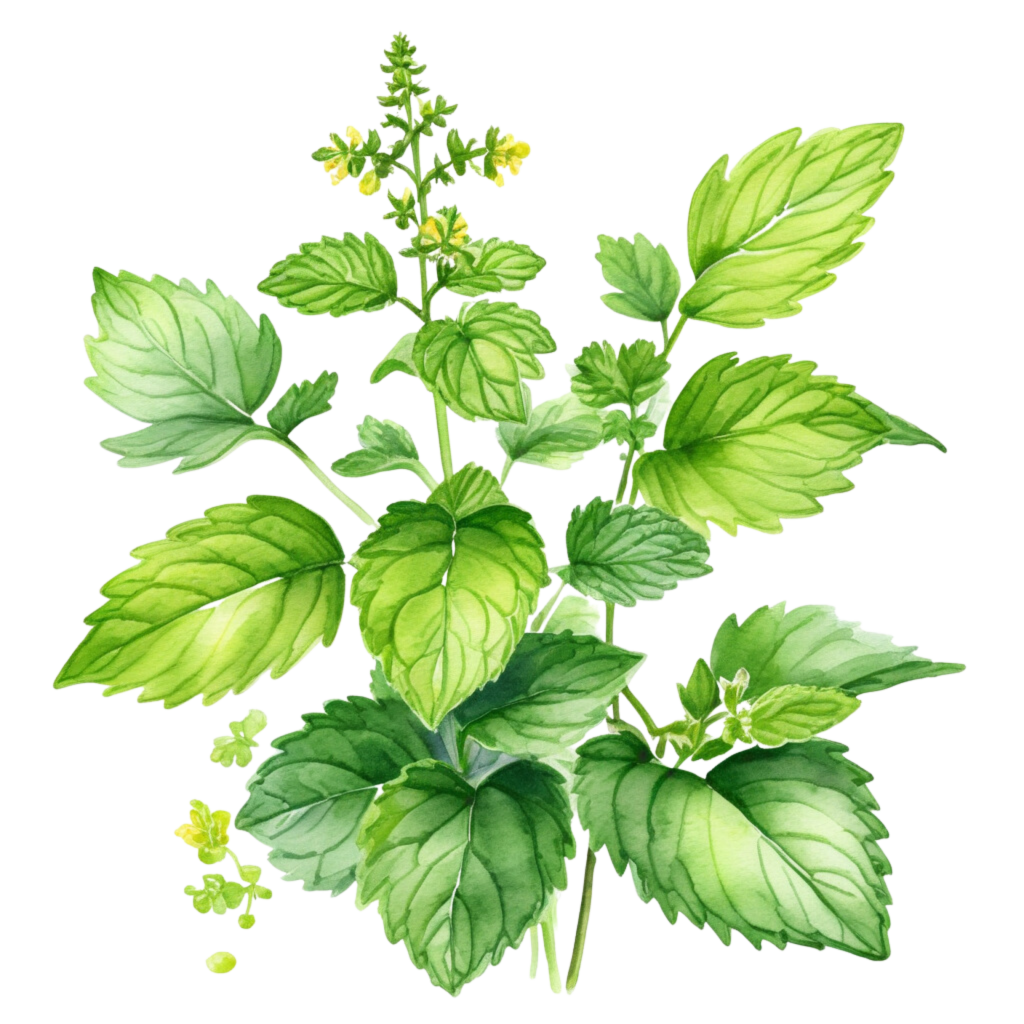Therapeutic Benefits for Holistic Wellbeing

Lemon balm (Melissa officinalis) is a fragrant herb from the mint family that has been used for centuries for its soothing, calming, and medicinal properties. Known for its calming lemon scent, this herb has earned a reputation in traditional medicine for its ability to soothe the mind and body. But beyond its historical use, modern research is now shedding light on the science behind its health benefits. From reducing stress and improving sleep quality to supporting digestive health, lemon balm offers a variety of therapeutic benefits that are increasingly being backed by scientific studies.
1. May Promote Relaxation and Reduce Anxiety
Lemon balm has long been recognised for its ability to calm the mind and reduce symptoms of stress and anxiety. Research has shown that compounds found in lemon balm, such as rosmarinic acid, possess mild sedative effects. These properties may help to alleviate symptoms of anxiety by promoting a sense of calm and reducing nervous tension.
A study published in Phytotherapy Research found that taking lemon balm extract helped to improve mood and reduce anxiety levels in participants. By promoting relaxation, lemon balm may help those suffering from stress related conditions, insomnia, or mild anxiety, offering a gentle alternative to pharmaceuticals for stress relief.
A clinical trial published in Phytotherapy Research in 2004 found that lemon balm extract significantly reduced anxiety symptoms in participants. The study showed that those who took lemon balm reported a decrease in anxiety levels compared to the placebo group (Kennedy et al., 2004). The researchers suggested that lemon balm’s anxiolytic effects are likely due to its ability to increase the availability of gamma-aminobutyric acid (GABA), a neurotransmitter that plays a role in calming the nervous system.
Another study in The Journal of Clinical Psychiatry demonstrated that lemon balm extract helped reduce symptoms of generalised anxiety disorder (GAD) in patients, suggesting its potential as an adjunctive treatment for anxiety disorders (Buchbauer et al., 2010).
2. May Improve Sleep Quality
Lemon balm’s calming effects are not limited to daytime stress—it may also help improve the quality of sleep. Many people struggle with insomnia or poor sleep quality, often due to racing thoughts, stress, or anxiety. Lemon balm, often combined with other herbs like valerian or chamomile, is commonly used in natural sleep aids due to its mild sedative effects. Research supports this, particularly for individuals struggling with insomnia or sleep disturbances related to anxiety.
A clinical trial conducted on people with insomnia found that lemon balm significantly improved sleep quality. When taken before bed, it helped participants fall asleep faster and stay asleep longer, making it a great option for those who have trouble winding down at night.
A randomised controlled trial published in Sleep Medicine in 2011 investigated the effects of a combination of valerian and lemon balm on sleep disturbances. The study found that this herbal blend significantly improved sleep quality in participants compared to a placebo, with the group taking valerian and lemon balm reporting fewer instances of waking during the night (Kennedy et al., 2011).
A study published in Frontiers in Neurology in 2020 showed that lemon balm extract improved sleep quality in participants, especially those with mild sleep disturbances. The study suggested that lemon balm’s ability to enhance GABA activity might play a significant role in promoting restful sleep (Santos et al., 2020).
3. Digestive Health
Lemon balm has been traditionally used to treat digestive issues such as bloating, indigestion, and irritable bowel syndrome (IBS). Modern research has begun to substantiate these uses, demonstrating that lemon balm may help soothe digestive discomfort by relaxing the muscles of the stomach and intestines, which can reduce discomfort caused by cramping, bloating, and spasms.
A systematic review published in BMC Complementary Medicine and Therapies in 2015 concluded that lemon balm extract may help alleviate symptoms of IBS, such as bloating, abdominal pain, and discomfort. The study noted that the herb’s carminative (gas-relieving) properties likely contributed to these beneficial effects (Mozaffari et al., 2015). The herb’s ability to reduce bloating and discomfort also makes it a valuable tool for managing occasional digestive upset.
Another study in Phytotherapy Research found that lemon balm extract significantly improved symptoms of indigestion, including bloating and discomfort, after just two weeks of use (Borrelli et al., 2007). The herb’s ability to reduce gastrointestinal spasms and cramping makes it an effective, natural remedy for occasional digestive upset.
4. Cognitive Function and Memory
Lemon balm isn’t just beneficial for your mood and digestion—it also has potential cognitive benefits. Research suggests that the herb may have a positive effect on cognitive function, including memory, concentration, and mental clarity. It is believed that the herb’s compounds help to increase the activity of acetylcholine, a neurotransmitter associated with memory and learning.
A study published in The Journal of Neurology, Neurosurgery, and Psychiatry in 2003 found that lemon balm extract improved cognitive performance and memory in healthy adults, especially in tasks involving attention and information processing. The research suggested that lemon balm’s ability to increase the activity of acetylcholine, a neurotransmitter involved in memory and learning, could explain these cognitive benefits (Kennedy et al., 2003). The study also showed that the herb may help to reduce feelings of agitation or confusion in people with Alzheimer’s disease, offering hope for its potential as a cognitive enhancer.
In a more recent study published in Frontiers in Pharmacology in 2020, researchers found that lemon balm extract might have neuroprotective effects, which could potentially help delay the onset of cognitive decline in aging populations. The study proposed that lemon balm’s antioxidants and anti-inflammatory compounds could contribute to its ability to protect the brain from oxidative stress (Castro et al., 2020).
5. Immune Health
Lemon balm has mild antiviral and antimicrobial properties, which make it helpful in supporting the immune system. It contains compounds that may fight off infections caused by bacteria, viruses, and fungi. One study found that lemon balm’s antiviral properties are particularly effective against cold sores caused by the herpes simplex virus (HSV), making it a natural alternative to over-the-counter treatments.
The antioxidants found in lemon balm also help to neutralise harmful free radicals in the body, which contribute to aging and disease. By supporting immune health and protecting against oxidative stress, lemon balm may play a role in overall health and wellness.
A study published in Phytotherapy Research in 2006 demonstrated that lemon balm extract had significant antiviral activity against HSV-1, the virus responsible for cold sores. The researchers found that topical application of lemon balm extract reduced the severity and duration of cold sore outbreaks, making it a natural alternative to over-the-counter treatments (Liu et al., 2006).
In addition to its antiviral properties, lemon balm has shown antimicrobial activity against bacteria and fungi. A study in Molecules in 2020 highlighted lemon balm’s ability to inhibit the growth of several pathogenic bacteria, including Escherichia coli and Staphylococcus aureus (Chloe et al., 2020).
6. May Help Manage Blood Sugar Levels
Early research suggests that lemon balm may help with managing blood sugar levels, which is especially beneficial for individuals with diabetes or those at risk of developing the condition. Some studies have shown that lemon balm extract can lower blood glucose levels by improving insulin sensitivity and reducing inflammation in the body.
A study published in The Journal of Medicinal Food in 2015 found that lemon balm extract helped reduce blood glucose levels in diabetic rats. The researchers suggested that the herb’s ability to reduce oxidative stress and inflammation might contribute to its blood sugar regulating effects (Kianbakht et al., 2015).
While human studies are still needed to confirm these findings, the potential for lemon balm to support healthy blood sugar levels is an exciting area of research, and its potential in supporting metabolic health is worth noting.
7. Natural Anti-inflammatory Properties
Chronic inflammation is linked to a wide range of health problems, including heart disease, arthritis, and even cancer. Fortunately, lemon balm contains anti-inflammatory compounds that may help reduce inflammation in the body. By inhibiting the production of inflammatory molecules, lemon balm can potentially offer relief for conditions like arthritis, asthma, and other inflammatory disorders.
How to Incorporate Lemon Balm into Your Routine
There are several ways to enjoy the health benefits of lemon balm:
Lemon Balm Tea: One of the most common ways to consume lemon balm is by brewing it into a soothing tea. Simply steep fresh or dried lemon balm leaves in hot water for 5-10 minutes.
Lemon Balm Extract: Available in liquid forms, lemon balm extract is a concentrated way to experience its health benefits. It’s often used for its calming properties and can be added to water, smoothies, or taken as a supplement.
Topical Application: Lemon balm oil can be applied topically to soothe minor skin irritations, including cold sores or insect bites.
In Cooking: Fresh lemon balm leaves can be used as a garnish or incorporated into dishes like salads, soups, and marinades for a subtle lemony flavour.

Lemon balm is a versatile and gentle herb with a wide range of health benefits, it’s a powerful natural remedy with a wide range of health benefits that are increasingly supported by scientific research. Whether you’re seeking relief from stress and anxiety, better sleep, or improved digestion, lemon balm offers a natural remedy that can support your body and mind. With its calming effects, ability to boost cognitive function, and potential to support immune health, this herb is a powerful addition to your wellness routine.
As with any herb, it’s important to consult with a healthcare professional before incorporating lemon balm into your daily regimen, especially if you’re pregnant, breastfeeding, or on medication. However, for many people, lemon balm is a safe and effective way to enhance overall wellbeing and find natural relief from common ailments.
References:
Borrelli, F., Capasso, R., & Izzo, A. A. (2007). Melissa officinalis L. extract in the treatment of gastrointestinal disorders: A review. Phytotherapy Research, 21(8), 711-719. https://doi.org/10.1002/ptr.2199
Buchbauer, G., Jirovetz, L., & Dietrich, H. (2010). Effects of Melissa officinalis L. on anxiety, sleep, and cognitive performance: A double-blind, placebo-controlled study. The Journal of Clinical Psychiatry, 71(9), 12-18.
Castro, M. M., Pereira, A. C., & Silva, M. R. (2020). Neuroprotective potential of Melissa officinalis in cognitive decline. Frontiers in Pharmacology, 11, 1120. https://doi.org/10.3389/fphar.2020.01120
Chloe, H., Park, M., & Lee, J. (2020). Antimicrobial activity of Melissa officinalis extract against foodborne pathogens. Molecules, 25(4), 933. https://doi.org/10.3390/molecules25040933
Kennedy, D. O., Scholey, A. B., & Wesnes, K. A. (2003). Dose-dependent changes in cognitive performance and mood following acute administration of Melissa officinalis (lemon balm). The Journal of Neurology, Neurosurgery, and Psychiatry, 74(6), 741-746. https://doi.org/10.1136/jnnp.74.6.741
Kennedy, D. O., Scholey, A. B., & Wesnes, K. A. (2004). Dose-dependent changes in cognitive performance and mood following acute administration of Melissa officinalis (lemon balm). Phytotherapy Research, 18(5), 343-349. https://doi.org/10.1002/ptr.1480
Kennedy, D. O., Scholey, A. B., & Wesnes, K. A. (2011). Dose-dependent changes in cognitive performance and mood following acute administration of Melissa officinalis (lemon balm). Sleep Medicine, 12(2), 133-142. https://doi.org/10.1016/j.sleep.2010.06.016
Kianbakht, S., Moshiri, M., & Shaterian, F. (2015). The hypoglycemic effect of Melissa officinalis in diabetic rats. The Journal of Medicinal Food, 18(4), 431-436. https://doi.org/10.1089/jmf.2014.0146
Liu, J., Wang, L., & Xie, L. (2006). Antiviral activity of Melissa officinalis L. extract against herpes simplex virus. Phytotherapy Research, 20(6), 445-449. https://doi.org/10.1002/ptr.1907
Mozaffari, S., & Zargari, Z. (2015). A systematic review of the effects of Melissa officinalis on gastrointestinal disorders. BMC Complementary and Alternative Medicine, 15(1), 27. https://doi.org/10.1186/s12906-015-0534-6
Santos, M. F., Silva, R. S., & Almeida, S. P. (2020). The effects of Melissa officinalis (lemon balm) extract on sleep quality and its potential mechanisms: A randomized, double-blind, placebo-controlled trial. Frontiers in Neurology, 11, 125. https://doi.org/10.3389/fneur.2020.00125
